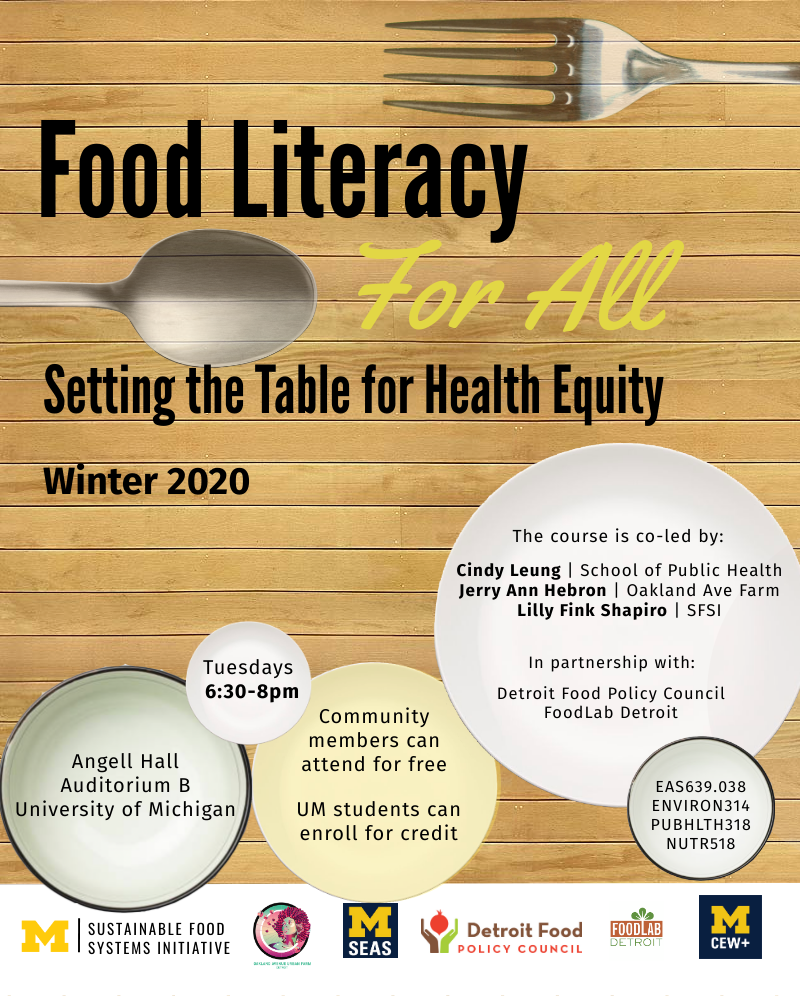UPDATE: Food Literacy will be moving to an online format starting on Tuesday, March 17, and will continue to be virtual through the remainder of the semester. We are attempting to quickly adapt our course and we appreciate your flexibility and understanding during this time. We know this is not a perfect solution, but we will strive to bring a similar experience to the course that we have had all year with our in-person lectures.
Food Literacy for All will take place again for a fourth year during the winter semester of 2020. UM students can enroll in the course for credit and community members can attend the series for free. More information coming soon.
Food Literacy for All is a community-academic partnership course started in 2017. Structured as an evening lecture series, Food Literacy for All features different guest speakers each week to address challenges and opportunities of diverse food systems. The course is designed to prioritize engaged scholarship that connects theory and practice. By bringing national and global leaders, we aim to ignite new conversations and deepen existing commitments to building more equitable, health-promoting, and ecologically sustainable food systems.
#FoodLiteracyforAll
January 14: Cindy Leung, Jerry Hebron, Lilly Fink Shapiro, Devita Davison, Winona Bynum
“Setting the Table for Health Equity” | Watch the video here
January 21: Jessica Holmes
“Health Inequities: The Poor Person’s Experience in America” | Watch the video here
January 28: Pakou Hang
“Racial Justice and Equity in the Food System: Going Beyond the Roots” | Watch the video here
February 4: Robert Lustig
“Corporate Wealth or Public Health?” | Watch the video here
February 11: Zahir Janmohamed
“De-colonizing Food Journalism” | Watch the video here
February 18: Nicole Taylor
“The Disruption of Traditional Food Media” | Watch the video here
February 25: Panel with Naim Edwards and Ashley Atkinson
“The Hidden Plight of Modern Growers” | Watch the video here
March 10: Leah Penniman | Watch the video here
“Farming While Black: Uprooting Racism, Seeding Sovereignty”
March 17: Maryn McKenna *VIRTUAL ONLY
“Meat, Antibiotics, and the Power of Consumer Pressure”
March 24: Panel with Chef Lea Addington, Andrew Jones, & Annie Osborn *VIRTUAL ONLY
“To Impossible & Beyond: Are the New Plant Based Burgers Too Good to be True?”
March 31: Marlene Schwartz *VIRTUAL ONLY
“Promoting Wellness Through the Charitable Food System”
April 7: Terry Campbell *VIRTUAL ONLY
“The Farm Bill and National Food Policy”
April 14: Jennifer Falbe *VIRTUAL ONLY
“Big Soda vs. Public Health: Soda Taxes and Public Policy”
April 21: Course Conclusion *VIRTUAL ONLY
Course Summary
Concurrent food, energy, water, and climate crises, and a global rise in obesity amidst widespread hunger and undernutrition, have re-focused public attention on the deficiencies and complexities of the global food system. Yet, a diversity of ‘alternative’ food systems demonstrates that food systems can be nutrition sensitive, socially just, and conserve natural resources. Transforming food systems will require coordinated effort across scales, drawing upon diverse disciplinary and practical perspectives, and understanding how value systems shape food and agriculture. Linking theory and practice is also essential, involving the full range of actors moving food from farm to fork.
This course offers a unique opportunity for students to gain an interdisciplinary introduction to food system issues through a seminar series bringing high profile speakers to campus from diverse sectors: policy, academia, grassroots movements, public health, conservation, and more. Students will integrate theory and practice through this partnership course that connects campus and community, led by a UM faculty member together with a co-instructor working to develop urban agriculture and enhance food justice and food sovereignty in Detroit. Students will develop competencies and cognitive skills in the area of food system sustainability including critical and systems thinking, community engagement, creativity, and analytical ability.
Watch Food Literacy for All Videos
This course is presented by the UM Sustainable Food Systems Initiative, with support from the Food Systems Theme in the School of Environment and Sustainability (SEAS), the Center for Latin and Caribbean Studies (LACS), the CEW+ Frances and Sydney Lewis Visiting Leaders Fund, the Residential College, the School of Public Health’s Department of Nutritional Sciences, the Department of English Language and Literature, the Center for Academic Innovation, and the King•Chávez•Parks Visiting Professors Program.



